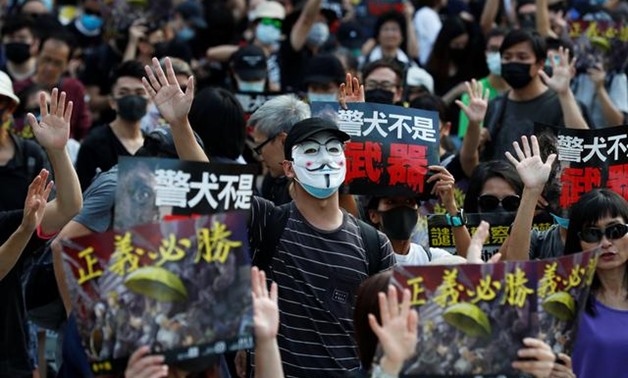
An anti-government demonstrator wearing a Anonymous mask attends a protest in Hong Kong's tourism district of Tsim Sha Tsui, China October 27, 2019. REUTERS/Kim Kyung-Hoon
HONG KONG (Reuters) - Hong Kong police fired volleys of tear gas to disperse thousands of protesters, many wearing banned face masks, who had converged on the Kowloon harbor-front hotel district on Sunday to denounce perceived police brutality over months of unrest.
There was a standoff as dusk began to fall, with protesters and bemused tourists gathered on the pavements of the key shopping and hotel artery of Nathan Road, which police had earlier cleared in slow-moving cordons.
Riot police stood by outside the Chungking Mansions high-rise warren of South Asian restaurants and backpacker hostels, shields and batons at the ready. Protesters shouted obscenities in colourful Cantonese at “black police”, referring to perceived over-use of force by the authorities.
“Fight for Hong Kong!” protesters shouted, “five demands, not one less”, a reference to demands for universal suffrage and an independent inquiry into police actions, among other things.
Hong Kong police fire tear gas to disperse protesters
The police had arrived earlier in the afternoon, warning protesters to leave the Tsim Sha Tsui district, opposite the British colonial-era Peninsula Hotel.
The number of protesters had grown by the minute, streaming down Nathan Road to the water’s edge, facing the dramatic skyline of Hong Kong island opposite, but many fled after the tear gas and pepper spray were fired.
Ambulances took one man away on a stretcher. The cause of his wounds was not immediately clear.
Police detained some protesters as they gathered, many yelling profanities while police used loudhailers to warn others away. The crowds at the waterfront had largely dispersed after a couple of hours and headed north up Nathan Road, where many luxury brand shops closed their shutters.
The rallying cry of the protesters was also for the protection of “Muslims, journalists and the people”.
A police water cannon fired bursts of blue-dyed water at a small group of people outside a Nathan Road mosque during protests last weekend, drawing criticism from some in the Muslim community. There was a large crowd of police outside the mosque on Sunday.
‘NO TO TOTALITARIANISM’
Billy, 26, a salesman, who did not want to give his full name, said he turned out on Sunday because he was angry at the spraying of the mosque.
“Hong Kong people, regardless of our religion ... we come here to say no to our totalitarian government,” he told Reuters, adding he wanted to protest peacefully. “I have a little bit of fear ... because our police sometimes they are uncontrollable and they threaten the safety of our people.”
Cindy Chu, 65, a retired nurse, said the police used to be a force for good.
“It’s so simple. They are disturbing the Hong Kong people,” she said. “And what for? What authority do they have to do that? It’s Hong Kong, not China.”
Chu said she was there to support journalists. When asked if she really wanted to give her full name, she said: “I am not afraid. If Hong Kong people are afraid of things like that, then the ending is not good.”
She too was wearing a face mask, banned under a colonial-era law re-introduced by Hong Kong leader Carrie Lam this month.
Pro-democracy activists have in recent weeks attacked police with petrol bombs and rocks and slashed one officer in the neck with a knife. Police have responded with tear gas, water cannon, rubber bullets and occasional live rounds, wounding several protesters and a few journalists.
Police deny accusations of brutality, saying they have shown restraint in life-threatening situations. There had been a week-long lull in clashes.
Protesters are angry about what they see as creeping Chinese interference in Hong Kong, a former British colony that returned to Chinese rule in 1997 under a “one country, two systems” formula intended to guarantee freedoms that are not enjoyed on the mainland.
China denies meddling. It has accused foreign governments, including the United States and Britain, of stirring up trouble.


Comments
Leave a Comment